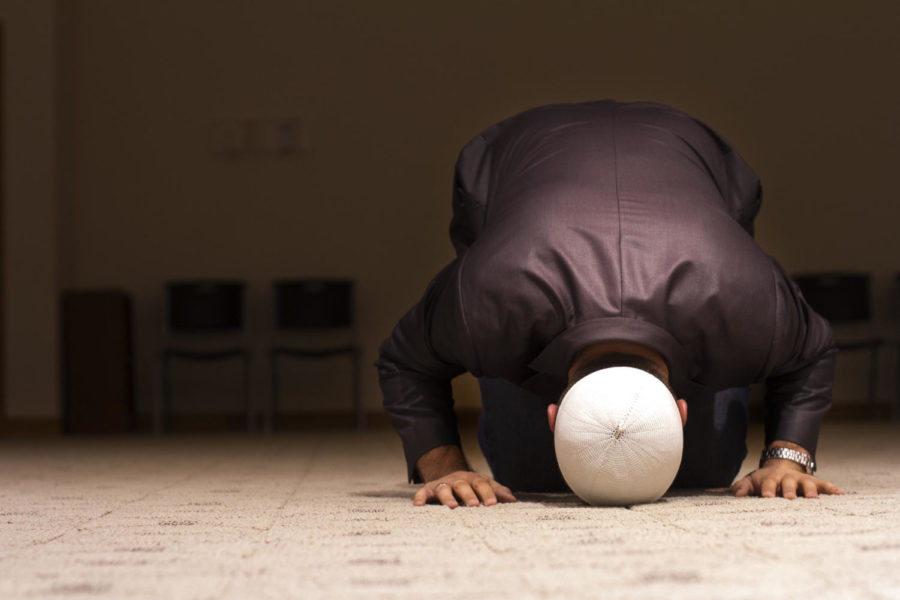Media stereotypes of Muslims are two-fold danger
Photo: Blake Lanser/Iowa State Daily
A member of the Darul Arqum Islamic Center in Ames prays during salat, the Islam pillar of prayer. Muslims pray toward Kaaba, a sacred building in Mecca. Islam is a peaceful religion, contradicting the prejudices formed after the 9/11 terrorist attacks.
February 17, 2016
Tasabeeh Musa, sophomore in liberal arts, is like many 20-year-old girls. Her dreams and goals are unique only to her, but she does hope to one day graduate college, start the career of her choosing, get married and maybe have children.
However, Musa is a student who has many identities. One of her identities makes her a part of a growing community of people in Ames because she is Muslim.
“Being Muslim, to me, is more than following the religion as a set of rules. It’s more of a guide. “[It] gives me a path to a better life,” Musa said.
She believes her religion has turned into a target with the growing size of anti-Muslim rhetoric making its way through televisions every day.
“My own mom has been yelled at in public by complete strangers because she was wearing her hijab,” Musa said. “She shouldn’t have to be scared and stop wearing her hijab and being a Muslim because it makes people uncomfortable. “Because of how the media portrays [her religion], she’s scared [of how] the negative influence is really being taken in by the [viewers].”
A study was published Feb. 3 by the ISU researchers who looked at the relationship between Muslim stereotypes and the negative portrayal in the media.
The study found that people who watched negative images of Muslims such as the 2007 terrorist attack on Fort Dix were likely “to be more supportive of military action in Muslim countries.” However, the study also found that participants who watched these negative issues also supported legal “restrictions” on Muslim-Americans as well.
For James Broucek, assistant professor of philosophy and religious studies, this isn’t a surprise.
“There are people that are predisposed to not like somebody or to treat them with suspicion or to make them feel uncomfortable or unwelcomed,” Broucek said. “And [these same people] may not be sensitive to these [studies] and they are pretty convinced that they know what people are like, whether they’ve met them or not. And they might not change their ways at all no matter how much you show them.”
Broucek believes some of the reasons anti-Muslim rhetoric is increasing is because people are not being shown positive images.
“I think that because the Muslim-American population is so small it’s a tough hurdle for people to overcome these negative ideas of what Muslims are,” Broucek said. “They have good counter evidence available, but it’s just not as powerful as actually knowing someone.”
Broucek believes society can work to improve the way it sees Muslims and the religion of Islam around the world and in America. He believes the key to getting rid of these stereotypes is actually getting to know the people and the culture.
“I think that as the Muslim community grows in the United States, more mosques are built and more people [will begin to] recognize that nothing has happened to their community or has affected it negatively,” Broucek said.
Broucek also determined that the more Muslim friends people have, the more society will begin to see the dissolution of these stereotypes.
“I can imagine a future that we have more Muslim communities and people see them as normal and no one is threatened,” he said. “Then we can see things become less heated.”
For Musa, she doesn’t see this trend of anti-Muslim perceptions ending anytime soon.
“I definitely think we can get rid of these stereotypes, but it is going to take awhile,” Musa said. “From what I have experienced and the things that I’ve seen and the way the media portrays us, I just don’t see it ending anytime soon. And honestly, if it’s not Muslims right now, it’s going to be another group that’s going to be the outlier in America.”







